Thegrader
On this page, you find all documents, package deals, and flashcards offered by seller THEGRADER.
- 661
- 0
- 0
Community
- Followers
- Following
661 items
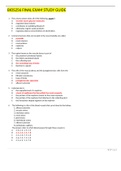
BIOS256 FINAL EXAM STUDY GUIDE
BIOS256 FINAL EXAM STUDY GUIDE1 The urinary system does all of the following, EXCEPT it A secretes excess glucose molecules B regulates blood volume C contributes to stabilizing blood pH D eliminates organic waste products E regulates plasma concentrations of electrolytes 2 Conical structures that are located in the renal medulla are called A pyramids B renal columns C renal pelvises D nephrons E calyces 3 The region known as the macula densa is part of A the proximal...
- Exam (elaborations)
- • 16 pages •
BIOS256 FINAL EXAM STUDY GUIDE1 The urinary system does all of the following, EXCEPT it A secretes excess glucose molecules B regulates blood volume C contributes to stabilizing blood pH D eliminates organic waste products E regulates plasma concentrations of electrolytes 2 Conical structures that are located in the renal medulla are called A pyramids B renal columns C renal pelvises D nephrons E calyces 3 The region known as the macula densa is part of A the proximal...
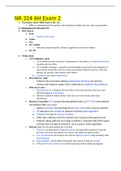
NR 324 AH Exam 2
NR 324 AH Exam 21. Pacemaker safety-MRI, battery life, etc. a. MRI is contraindicated for patients with implanted metallic devices such as pacemakers 2. Delegation to UAP and LVN 3. Diet choices- a. Iron i. Egg & whole grain b. Folate c. B12 d. low sodium i. Milk and yogurt naturally contain a significant amount of sodium e. low fat i. 4. Medications: a. ACE Inhibitors (pril) i. ACE inhibitors cause retention of potassium by the kidney, so hyperkalemia is a possible adverse eff...
- Exam (elaborations)
- • 4 pages •
NR 324 AH Exam 21. Pacemaker safety-MRI, battery life, etc. a. MRI is contraindicated for patients with implanted metallic devices such as pacemakers 2. Delegation to UAP and LVN 3. Diet choices- a. Iron i. Egg & whole grain b. Folate c. B12 d. low sodium i. Milk and yogurt naturally contain a significant amount of sodium e. low fat i. 4. Medications: a. ACE Inhibitors (pril) i. ACE inhibitors cause retention of potassium by the kidney, so hyperkalemia is a possible adverse eff...
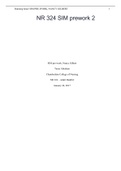
NR 324 SIM prework 2
NR 324 SIM prework 2
- Exam (elaborations)
- • 3 pages •
NR 324 SIM prework 2
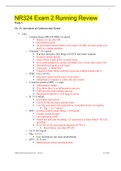
NR324 Exam 2 Running Review
NR324 Exam 2 Running ReviewCh. 31: Assessment of Cardiovascular System • Labs o Creatine kinase MB (CK-MB): 2-6 ng/mL Release 4-6 hrs after MI Myocardial muscle So myocardial muscle death it will release CK-MB, elevated means cell death so a cardiac problem o Troponin: < 0.3 ng/mL If pt has chest pain, first thing is do ECG and check troponin Found in cardiac muscle Enters blood stream before creatine kinase Go to gold standard for cardiac cell d...
- Exam (elaborations)
- • 21 pages •
NR324 Exam 2 Running ReviewCh. 31: Assessment of Cardiovascular System • Labs o Creatine kinase MB (CK-MB): 2-6 ng/mL Release 4-6 hrs after MI Myocardial muscle So myocardial muscle death it will release CK-MB, elevated means cell death so a cardiac problem o Troponin: < 0.3 ng/mL If pt has chest pain, first thing is do ECG and check troponin Found in cardiac muscle Enters blood stream before creatine kinase Go to gold standard for cardiac cell d...
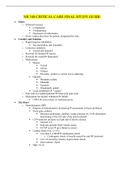
NR 340 CRITICAL CARE FINAL STUDY GUIDE
NR 340 CRITICAL CARE FINAL STUDY GUIDE• Ethics o Informed consent Competence Voluntariness Disclosure of information o Proxy- makes decisions for patient, designated by state • Comfort and Sedation o Rapid sequence intubation Succinocholine and etomidate o Conscious sedations Versed and fentanyl o Reversal for fentanyl narcan o Reversal for versed flumazenil o Medications Benzos • Versed • Ativan • Valium • Precedex- similar to verse...
- Exam (elaborations)
- • 14 pages •
NR 340 CRITICAL CARE FINAL STUDY GUIDE• Ethics o Informed consent Competence Voluntariness Disclosure of information o Proxy- makes decisions for patient, designated by state • Comfort and Sedation o Rapid sequence intubation Succinocholine and etomidate o Conscious sedations Versed and fentanyl o Reversal for fentanyl narcan o Reversal for versed flumazenil o Medications Benzos • Versed • Ativan • Valium • Precedex- similar to verse...
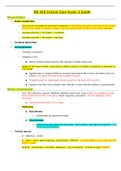
NR 340 Critical Care Exam 3 Guide
NR 340 Critical Care Exam 3 Guide· Brain metabolism o Soul source of energy for the brain is glucose. Brain needs glucose to function. Brain cannot store it, but needs a constant supply. If glucose levels start to fall you will some changed. o Cerebral glucose < 70 mg/dL = confusion o Cerebral glucose < 20 mg/dL = damage · Cerebral blood flow · Autoregulation o Changes in pressure o Changes in CO2 ▪ Alters cerebral blood volume with change in blood vessel size o Ability ...
- Exam (elaborations)
- • 27 pages •
NR 340 Critical Care Exam 3 Guide· Brain metabolism o Soul source of energy for the brain is glucose. Brain needs glucose to function. Brain cannot store it, but needs a constant supply. If glucose levels start to fall you will some changed. o Cerebral glucose < 70 mg/dL = confusion o Cerebral glucose < 20 mg/dL = damage · Cerebral blood flow · Autoregulation o Changes in pressure o Changes in CO2 ▪ Alters cerebral blood volume with change in blood vessel size o Ability ...
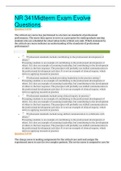
NR 341Midterm Exam Evolve Questions.
NR 341Midterm Exam Evolve Questions.
- Exam (elaborations)
- • 61 pages •
NR 341Midterm Exam Evolve Questions.
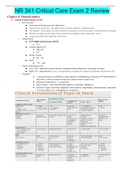
NR 341 Critical Care Exam 2 Review
NR 341 Critical Care Exam 2 ReviewChapter 8: Hemodynamics ● Central Venous Pressure (CVP) ○ How assessed ■ Need central line that goes into right atrium ■ Arterial lines are placed in the radial (most common), brachial, or femoral artery. ■ The integrity of the arterial waveform should be assessed to verify the accuracy of blood pressure readings. ■ Monitor circulation in the limb with the arterial line (capillary refill, temperature, color). ■ Assesses preload of the right...
- Exam (elaborations)
- • 14 pages •
NR 341 Critical Care Exam 2 ReviewChapter 8: Hemodynamics ● Central Venous Pressure (CVP) ○ How assessed ■ Need central line that goes into right atrium ■ Arterial lines are placed in the radial (most common), brachial, or femoral artery. ■ The integrity of the arterial waveform should be assessed to verify the accuracy of blood pressure readings. ■ Monitor circulation in the limb with the arterial line (capillary refill, temperature, color). ■ Assesses preload of the right...
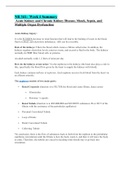
NR 341: Week 4 Summary
NR 341: Week 4 SummaryAcute Kidney and Chronic Kidney Disease; Shock, Sepsis, and Multiple Organ Dysfunction Acute Kidney Injury: It is the SUDDEN decrease in renal function that will lead to the buildup of waste in the blood, fluid overload, and electrolyte imbalances. AKI can be reversible. Role of the kidneys: Filters the blood which creates a filtrate called urine. In addition, the kidneys regulate electrolyte levels, removes waste, and excessive fluid in the body. The kidneys normally...
- Exam (elaborations)
- • 14 pages •
NR 341: Week 4 SummaryAcute Kidney and Chronic Kidney Disease; Shock, Sepsis, and Multiple Organ Dysfunction Acute Kidney Injury: It is the SUDDEN decrease in renal function that will lead to the buildup of waste in the blood, fluid overload, and electrolyte imbalances. AKI can be reversible. Role of the kidneys: Filters the blood which creates a filtrate called urine. In addition, the kidneys regulate electrolyte levels, removes waste, and excessive fluid in the body. The kidneys normally...
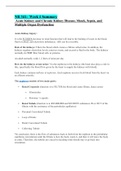
NR 341: Week 4 Summary
NR 341: Week 4 SummaryAcute Kidney and Chronic Kidney Disease; Shock, Sepsis, and Multiple Organ Dysfunction Acute Kidney Injury: It is the SUDDEN decrease in renal function that will lead to the buildup of waste in the blood, fluid overload, and electrolyte imbalances. AKI can be reversible. Role of the kidneys: Filters the blood which creates a filtrate called urine. In addition, the kidneys regulate electrolyte levels, removes waste, and excessive fluid in the body. The kidneys normally...
- Exam (elaborations)
- • 14 pages •
NR 341: Week 4 SummaryAcute Kidney and Chronic Kidney Disease; Shock, Sepsis, and Multiple Organ Dysfunction Acute Kidney Injury: It is the SUDDEN decrease in renal function that will lead to the buildup of waste in the blood, fluid overload, and electrolyte imbalances. AKI can be reversible. Role of the kidneys: Filters the blood which creates a filtrate called urine. In addition, the kidneys regulate electrolyte levels, removes waste, and excessive fluid in the body. The kidneys normally...
